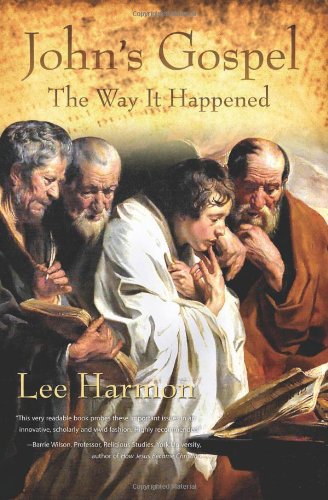As the publication date gets closer, I’m getting more excited about John’s Gospel, my sequel to Revelation. I have a few Advance Reader Copies remaining; if anyone is interested in providing a review, please contact me at lharmon@thewayithappened.com!
This early review is by an internet friend I met on a religious forum: Alan Vandermyden. He just opened a new blog at http://alponders.blogspot.com. Thanks, Alan!
_______________________________________________
Two or three years ago, Deepak Chopra’s Jesus left me with a new sense of Jesus as an historical person—not that Chopra’s book is in any way a definitive biography of Jesus, but in the sense that I began to see Jesus as a person, like each of us, with a story, as he was led to an understanding of his role and purpose in life.
Lee Harmon’s new book—John’s Gospel: The Way It Happened—led me more deeply into this story and into those of other individuals: those of Peter and Paul, and most particularly, of the apostle John. And, perhaps more to the point, it brought an historic perspective to the writing of the four gospels and Revelation. What was once a source of confusion and tension within my own being, as I desperately attempted to “make things fit” with each other and with my own religious understanding, now becomes a weaving together of stories—those of other persons also grappling to understand God and their role in life.
Lee simply tells a story that allows disagreement and differences of understanding between the writers of these books, as well as differences in understanding at different points in their lives—growth. An aged and dying John strives to convey his new understanding of a triumphant Christ of love—far different than the “militarily” victorious Jesus of his Revelation—to Matthew and a young, believing woman of Ephesus. Matthew defends explanations and interpretations he had penned in his gospel—events which “must have occurred” because the scripture prophesied them concerning the Messiah. He had to be born in Bethlehem. He had to be born of a virgin. Matthew does what we persist in doing today, as we attempt to interpret writings as a foretelling of future events, rather than understanding them as bringing relevant understanding to believers in their own times.
Lee accomplishes this without making others—anyone—“wrong.” People are simply struggling to understand events occurring around them, and their own role in life. This historical perspective encourages us to go beyond simply throwing our hands up in disgust, muttering “the Bible is just a bunch of contradictions anyway.” A door is opened, through which we can also enter in to the story and grapple with our own understandings. For me, the Bible is no longer required to be an absolute, an infallible document dictated from heaven; but neither is it just a mess, full of contradictions. It has become a living testament of individuals’ engagement with the being we call “God.”
Though Lee and I have never met, we share a similar heritage, having grown up in families that were active participants in a fellowship officially named (in N. America) Christian Conventions, but which is more commonly referred to by members as “the truth,” “the friends,” or, more simply, “meeting” (a reference to home–based worship/fellowship gatherings). While my (and Lee’s) discontinued association with the fellowship might by implication challenge some beliefs they hold, I see no reason to define them as “wrong” or “bad.” Believe Lee’s book invaluably shows us that we no longer need to so define those who hold a different opinion than we. Each of our opinions is formed within a specific vantage point—a culture, a set of experiences—and we gain much through listening to and accepting other stories. Lee’s writing points this out in respect to the Bible—that set of writings that has so powerfully influenced the world—but the lesson also applies to each of us, today, as we seek to bring meaning to our own experience.
I thank Lee for a powerful, yet easy–to–read book and the extensive research involved.
